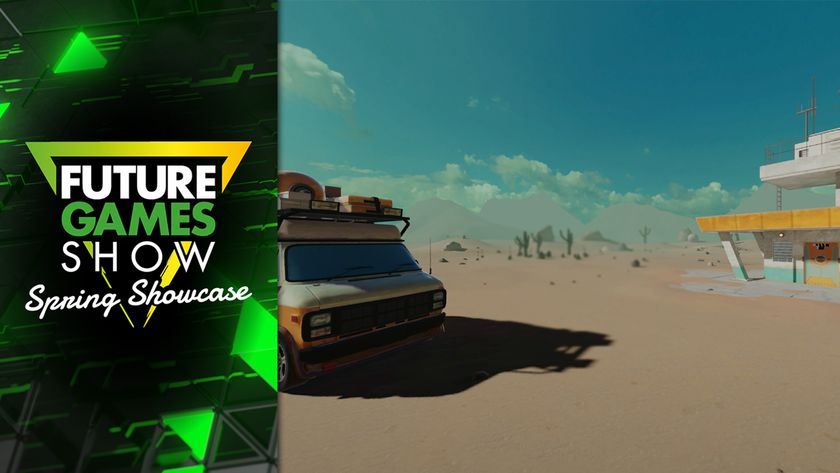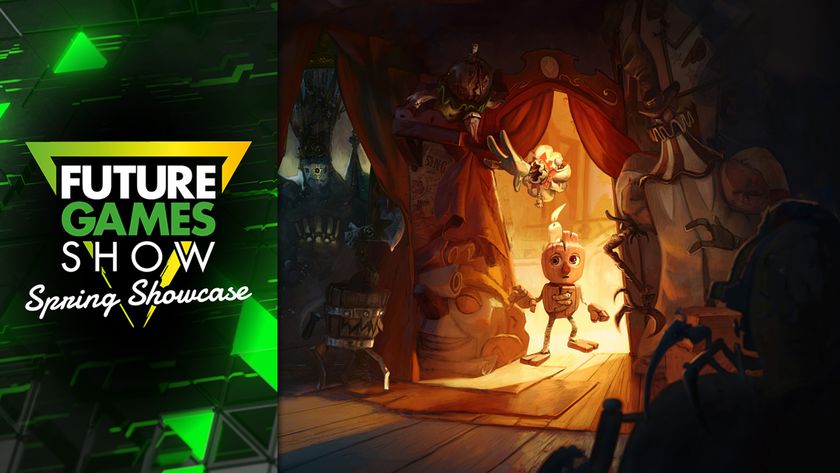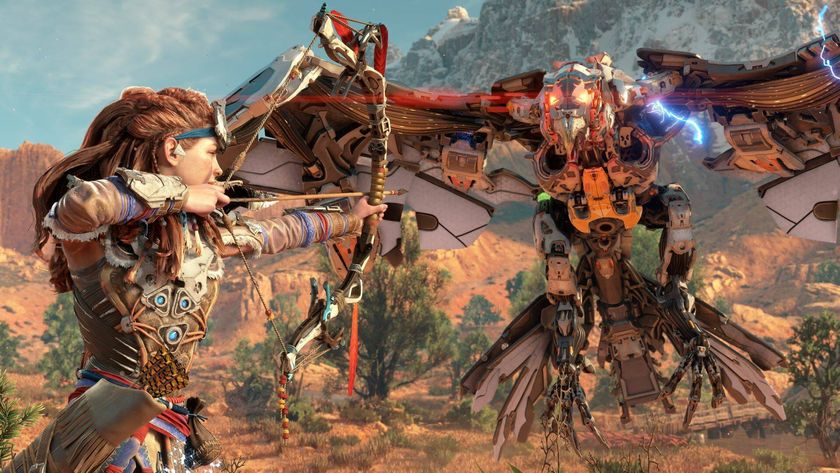Portal 2's dynamic music - an interview with composer Mike Morasky, and five tracks to listen to now!
Hear the 'old future through a new lens' as Valve's composer explains the adaptive sounds of Portal 2
Being raging game music nerds, however, we had to know more, and to our delight, Valve and Morasky, whose diverse talents you've probably already heard in Portal, Team Fortress 2, and the Left 4 Dead series, not only kindly agreed to answer our questions, but also threw in five brief clips from in-game tracks.
Pretty awesome, right? First up is the hyperactive bit-crushing "Robots FTW," below:
Above: "Robots FTW" - A banquet of bleeps (updated with full track via YouTube; original 1-minute cliphere)
The rest of the clips are scattered throughout our interview with Morasky, which cool people who like cool stuff should definitely read, because there's no better feeling than knowing more than other people about music.
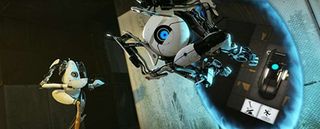
GamesRadar: What is Portal 2’s adaptive music system? How does it affect the experience?
Mike Morasky: We developed a brand new system that is used to handle all dynamic audio in Portal 2. As the system is very open and easy to customize, the types of musical interactivity we developed are widely varied and generally designed for the specific gameplay at hand. Overall the interactive musical experience tends to become one of exploration, as if the music is emanating from the facility and devices of Aperture Science itself, often giving the player total control over how much or little they want to expand that aspect of the experience.
GR: Can you give us an example of a situation in the game especially impacted by the new system?
Sign up to the 12DOVE Newsletter
Weekly digests, tales from the communities you love, and more
MM: There are several cases where the music adds channels and complexity as you successfully solve portions of the puzzle, with each additional piece of music actually coming from the device that is participating in the activated game play mechanic. Obviously, this can heighten the sense of achievement as one completes the puzzle but also turns the mechanics of the puzzle into a sort of interactive music instrument that you can explore by selectively triggering the different channels of music with differing timings and configurations. Most of the interactive music is also positional so that as you move through the space you also change the mix and volume of the music you are hearing, which invites explorations of the space as well.
Above: "Science Can Be Fun" - A high-energy track that you've probably heard in the trailers
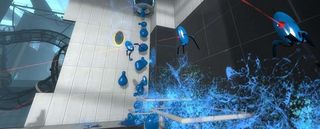
GR: Left 4 Dead’s AI incorporated dynamic musical cues. Was Portal 2’s system inspired by that work? Will it be applied to other, future games?
MM: Absolutely, the success of the interactive music in Left 4 Dead from a gameplay standpoint helped to broaden the internal interest in including dynamic music in Portal 2 as well as providing a technical basis from which we built the new, more generalized architecture. The two games are so different, however, that the goals and challenges in Portal 2 really drove us to implement the music in different ways and to solve different problems. With the openness of the technology we developed for P2 it'll be easy for us to adapt it to any type of approach that we think makes sense for our upcoming games.
GR: Was the system planned when you began development, or did it come up later?
MM: We knew we wanted some form of musical humor, surprise and interactivity, but not exactly what that would look like. We discussed many different approaches - making the game a music puzzle was even considered - and tried a bunch of experiments, but as with everything at Valve, it was ultimately developed in a very organic fashion by identifying opportunities and challenges through team collaboration and testing.
Above: "The Halls of Science" - A thoughtful journey through electromechanics

While there are some circumstances where the music provides feedback of success, it isn't really there to provide gameplay data as it did in L4D. In Portal 2, the music tends to serve as more of an expansion of the Aperture universe than anything else. One of the problems we encountered early on in our play-testing was puzzle fatigue. While we solved that problem from many different angles, the musical solution was to attempt to make the puzzle music fun and odd, as if, in an otherwise dark and threatening environment, the puzzles were happy that you were there playing with them. This solution helped to lighten and energize the puzzle space without forcing so much music on the player as to distract them from the problem at hand, solving the puzzle.
GR: Will we hear any tracks we remember from Portal, or is Portal 2’s soundtrack entirely new?
MM: There is that familiar tune played on the radio that everyone will recognize, otherwise the soundtrack is entirely new. The experience of Portal 2 is different in so many ways from Portal that it just really made sense to make it all new. We did, however, experiment with having some of the original music playing "on the fritz" in an old test chamber but it was generally just considered confusing and so we axed it.
GR: Does anything aside from the dynamic system stick out as a difference between the two soundtracks?
MM: There is an epic sense of drama in Portal 2 which is complimented by some cinematic underscore that would not have been appropriate in the first Portal, and while we very consciously maintained a certain homage to the ambient nature of the music in Portal, Portal 2 has much more variety in terms of styles and presentation of its music.
Above: "Reconstructing Science (micro mix)" - The dramatic theme from the teaser
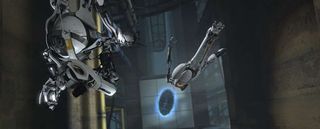
GR: Can you point to any specific inspirations for the music of Portal and Portal 2?
MM: Portal 1 had two distinctly different styles. The test chambers had a sort of "future of the 70's" vibe. Then, once you were "behind the scenes," it very consciously shifted to more of a "future of the 80's" style.
Portal 2 covers enough eras and moods that it'd be difficult to fully categorize them. It does, however, continue the "future of the past (modernized)" design sense established in Portal 1. There is electric piano via minimalism, minimalism via contemporary synths, chiptunes via mangling, even operetta via 80's sampling. The "old future through a new lens" design choice, even in the first Portal, was very much in keeping with the overall design of Aperture Science as an institution.
Above: "Some Assembly Required" - Aperture Labs' restless rhythmic locution
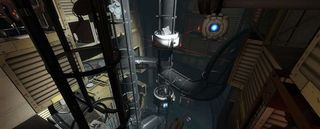
GR: Very generally - what is it like composing for the Portal series? What are we hearing?
MM: There are many conceptual elements at play in the Portal 2 soundtrack, but one of the key ideas is that of "artificiality" and the transition from organic to synthetic. As such, many of the cues and the score as a whole, transition from "acoustic" sounding instruments to purely electronic ones. There was also an attempt made to keep most of the compositions somewhat artificial sounding, as if they could have been created procedurally by Aperture Science. A lot of stiff arpeggios, math-like voice leading, odd rhythm patterns and whole tone scales. Interestingly, the only actual recording done was Ellen's voice [Ellen McLain voices GladOS], which as GladOS and the turrets are also probably some of the most expressive. Everything else is either purely electronic or at least sampled, nothing acoustic or organic was used and really, even Ellen's voice was heavily processed, and in some cases turned into samples before being reassembled via a sequencer to mimic a cheap form of synthetic singing.
-END-
Morasky's "math-like voice leading," "electric piano via minimalism," and "operetta via 80's sampling" will bounce off our ear drums in full when Portal 2 launches next Tuesday. We'd tell you not to forget to pay attention to the game's motion-sensitive melodies, but based on what we've heard so far, not standing out won't be a problem for Portal 2's soundtrack, especially considering that aside from Morasky's remarkable work, another track from Jonathan Coulton and a surprise contribution from The National are buried in the game.
According to Doug Lombardi, Valve's VP of marketing, there are currently no plans to release a Portal 2 soundtrack album, but we certainly hope that the game's score will be downloadable in full one day.
Apr 13, 2011

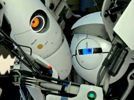
High-fiving robots, lasers of death and baboons. Yup, you’ve never played a co-op quite like...
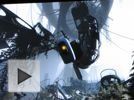
Unsure of how much further Portal 2 can take things? Prepare for a total brain melt

This modern masterpiece shakes the FPS genre to the very core

